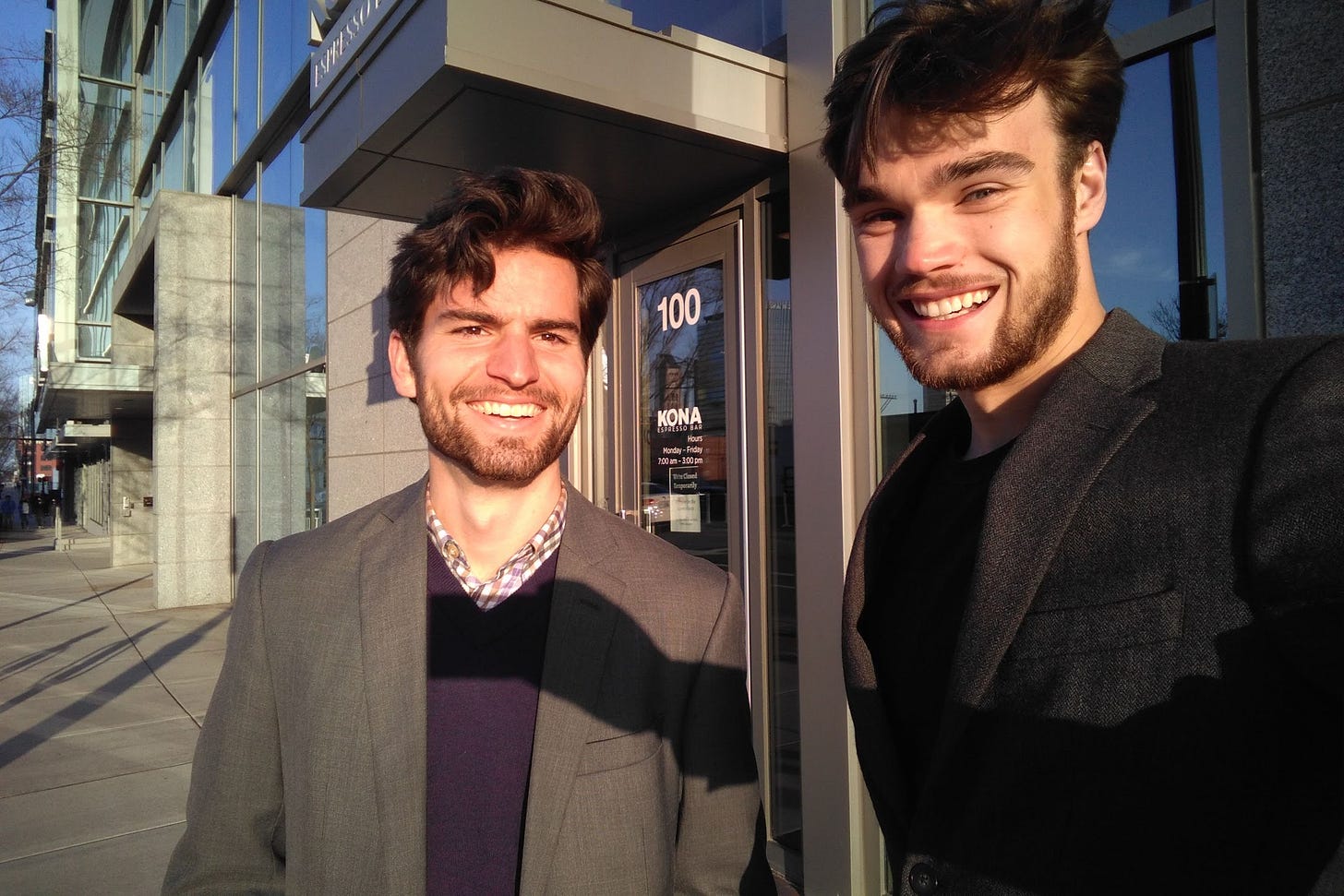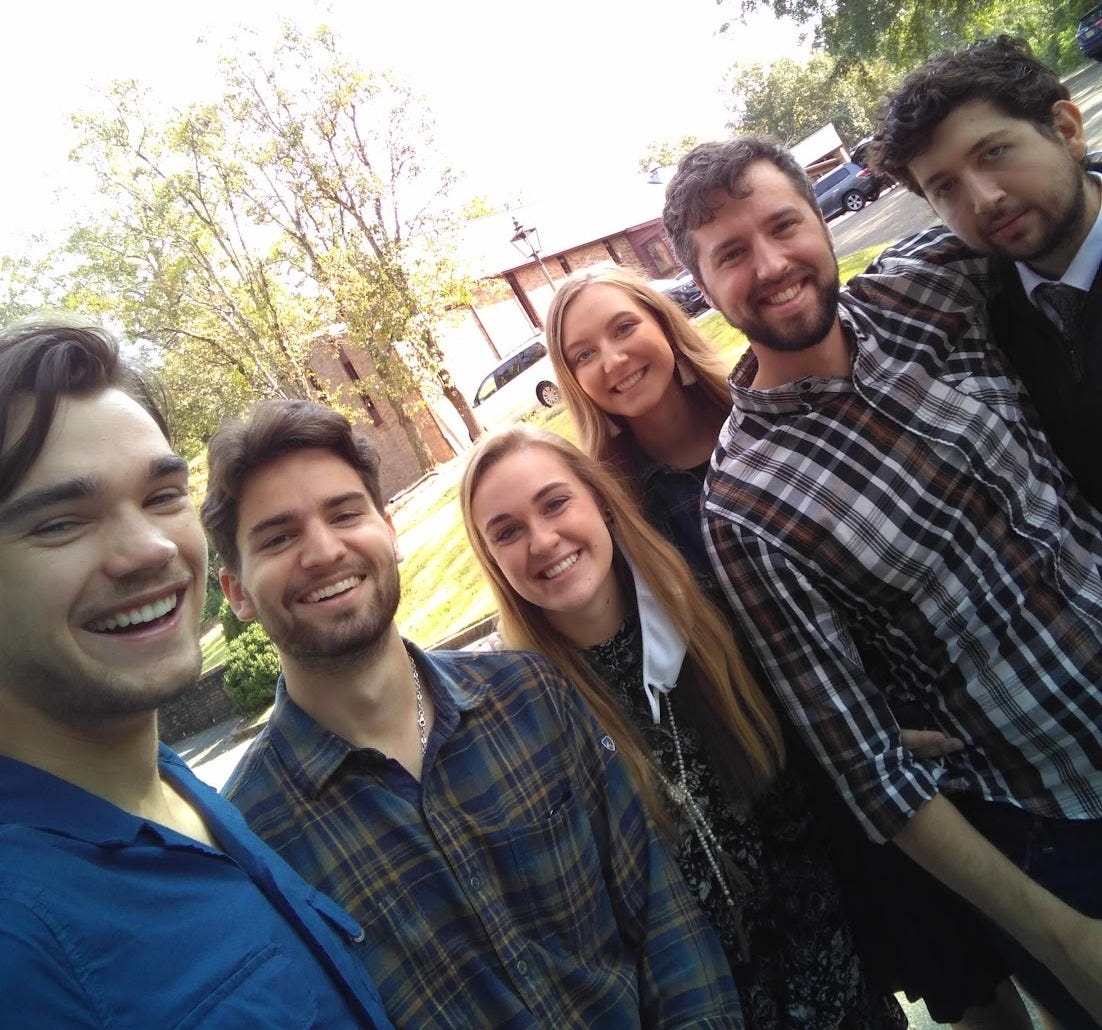A Love Letter to My Fellows
An Experimental Letter to my Friends on the Divine Origin of our Love with Direction from Aelred of Rievaulx
“Furthermore, a friend is called the guardian of love, or, as some prefer, the guardian of the soul itself. Why? Because it is proper for my friend to be the guardian of mutual love or of my very soul, that he may in loyal silence protect all the secrets of my spirit and may bear and endure according to his ability anything wicked he sees in my soul. For the friend will rejoice with my soul rejoicing, grieve with it grieving, and feel that everything that belongs to a friend belongs to himself.” -Aelred of Rievaulx, Spiritual Friendship 1.20
Jacob, Samuel, Benjamin and Caleb (Skippy), my fellows and friends, I pen you this letter, a homily of sorts, in hopes that the words I have read from this long dead Cistercian Abbot, the friend of King David of Scotland, and servant of the English Church, Aelred of Rievaulx, might provide you with a map for loving one another more deeply, sincerely, and fully, even as I desire to love each of you.
Aelred was a man trained for life in the politics of the twelfth century, three generations after the Norman Conquest. He was born the year Anselm died, and spent his time first in the king’s hall before taking up the monastic life as a Cistercian, a recently begun brotherhood seeking to return to the plain way of St. Benedict. His management, advice and pen were notable at the time, but today he is almost singularly known for his work on “Spiritual Friendship,” which forms the subject of my sermon. As I read the three dialogues of Aelred on friendship’s origin, obstacles, and end, each of you were laid on my heart, and my affection for all y’all was kindled.
It has been seven years since I first shook hands, joked, conversed, and befriended Jacob in the summer of 2018 at the check in desk for Summit Ministries. It was only a couple months later that I met Ben under the porch of the Student Union Building, where, coincidentally, he first laid eyes on his wife. I remember the first time Sam and I talked, at the Thomases house for our “What is Anglicanism” biweekly small group on Wednesday nights. I remember my first conversation with Skip, a morning where I made breakfast and we spoke for two and a half hours about missions, homeschooling, Lewis, British literature, and countless other topics, before he dropped off the map, only to occasionally reappear for the next 14 months before our friendship really stuck.
But as I consider these combined 27 years of friendship, of deep investment, of mutual support and comfort, I think it would be wise to invest just a few words on the nature of friendship, the qualities of a good friend, and the telos of fraternal concord, so that what we have invested in righteousness, wisdom, and adventure might grow into a flower of glory and love.
Friendship is, according to Cicero–that most American of orators–“agreement in things human and divine, with goodwill and charity.”1 The definition is appropriately broad, yet at first glance puts the onus of love and good will between the friends. This is from a humanly perspective certainly true and certainly pelagian, and thus almost impossible, and in the orator’s heavy-heathen heart he could not imagine more than three or four friendships in all of world history. Yet for the Christian, harmonious concord is the means of seeing and experiencing God, and so Christian friendship makes our love both far more common and far deeper than that which Aristotle could comprehend. The love between true friends presupposes a deeper love towards and lovingkindness from God. This can only come unilaterally from above, that “Love divine, all Loves excelling” which compellingly, in Wesley’s turn of phrase, descends as the Holy Spirit. Divine Love experienced in our hearts, is just as much a gift as our justification, an encounter with the person of God that we do not deserve. This encounter with the Divine is a bedrock of our faith.2
After this salvation is felt in the soul, friendship becomes a worldly-way of encountering God in the flesh, and yourself in another. This encounter with a true friend creates a magnanimity of the soul, both in the aspiring for the great object of friendship, and in seeking to understand the greatness of friendship.3 This constant rotation between activity of encounter and solitary contemplation reflects the fullness of man’s life and follows Jesus’ own pattern of leading his disciples and retreating to pray for them with the Lord. Doesn’t the joy felt in seeing a dear friend again, whether it’s been a day, month or a year, make your soul soar? Doesn’t seeking and wrestling a friend, physically or intellectually, strengthen the muscles and the mind? Don’t the weights of that friend become your own? I have stayed up at night seeking answers to your problems, considering good counsel to give, and I know you all have as well.
As a result of this greatness striven for, Aelred cannot help but feel his rhetoric rise to match his increase in love for his good friend: “friendship for the rich is a glory, for exiles a country, for the poor the remission of taxes, for the sick medicine, for the dead life, for the healthy a benefit, for the weak strength, and for the vigorous a reward.”4 This greatest gift of friendship is not a reward sought outside, but the friendship itself. The greatest joy with each of you is not what we accomplish or even contemplate together, though I love our conference and our activity, but the love I have come to know for each of you. “Surely ‘we delight not in any blessing won through friendship so much as in the true love of a friend.’”5 That love for each of you has made me a better pastor, a better husband, and a better student.
With all that said, I would like to examine advice Aelred gives for potential friendships. What are some qualities necessary to be a good friend?; who can be your friend?; what are some perennial challenges of friendship?
First being first, Aelred outlines in the block text attached at the top of my letter saying that to be a friend you must be a guardian of your friend’s soul. A good friend must have deep loyalty and long-suffering for his friend, perhaps even longer than he has for himself.6 Secondly, he must be a man who is able to bear with a friend who has made indiscretions in his speech and conduct.7 Friendship is not entered into lightly, nor is it to be broken easily. I have surely caused each of you offense, and each of you me, at some point. The ability to disregard that offense not through indifference, but through careful attention is demanded to preserve the friendship as a place where love can flourish.8 Nitpicking in a friendship, as in parenting or in marriage, will tend towards suffocation of the very fire needed to burn and shed light on the self and others. Lastly, if lifting up false gods in your heart cools your love for God and turns his anger against you, so will coveting your friend’s life, wife, skills, or influence cause irreparable division between you and them. Their instrumentalization will narrow you like sandpaper, until you become smooth and slippery, unable to be grasped firmly or to be bound to anything.9
Aelred spends much of his third book asking the question of who a suitable friend is, and though he is a Christian who democratizes friendship considerably, he still holds that many do not ever have a friend, and even those who desire friendship often lack it. This is all the more tragic because friendship is an image of heavenly life.10 It points those who have it and those who have seen it towards a greater knowledge of life everlasting by virtue of its steadfastness and unwearied affection.11
Take for instance, the four or five friends, made so by membership in a common church, who in speaking with love of God’s wonderful works in them and in Christ, their own miserable estate part from him, and the promises God made to them, who sliced through the formal piety of John Bunyan when he at first accidentally, and then entrancingly, and finally despairingly overheard their conversation, and was turned at once to his lack of salvation and affinity concerning true heavenly things.12 His writing on this point must be cited in full, for it provides the perfect illustration of the effects of friendship:
And, methought, they spake as if joy did make them speak; they spake with such pleasantness of scripture language, and with such appearance of grace in all they said, that they were to me, as if they had found a new world [emphasis added]; as if they were people that dwelt alone, and were not to be reckoned among their neighbours.13
In friendship, faith and love reveal the heavenlies, bring the saint closer to God, and can even bring the sinner to a right conviction of guilt.
At this I felt my own heart began to shake, and mistrust my condition to be naught; for I saw that in all my thoughts about religion and salvation, the new-birth did never enter into my mind; neither knew I the comfort of the word and promise, nor the deceitfulness and treachery of my own wicked heart.14
The welkin is opened to the chief of sinners when love and joy abound, where God’s words form the content and character of our speech.
Choosing and then testing a potential friend are the first two steps towards forming a lifelong friendship. A candidate must be tested first by the most general filter of seeing in him true goodness, for only good men can be friends.15 But goodness in outward action is not enough. After being shown a good man, Aelred astutely asks, “does this man love his own soul?”16 Love of self is, of course, impossible without love of God as Calvin says, and the loveless soul is a vagrant, wandering in vain for affection and warmth until he encounters the illumination of God in his soul. Until he knows that Jesus Christ is patient and kind with him, that Jesus Christ does not boast but invites the broken, until he knows that Jesus Christ suffers his many sins in patience, he will not be able to love himself honestly much less love another man as Christ first loved him.

Now if a man loves God and loves himself, if he is good, then he should be sifted according to that man’s right intention (purity of heart), his loyalty (honest and voluntary affection), his patience (humility), and his discretion (wisdom). If all of these are found in a friend (and are not severely wanting in yourself), then he is a good candidate for friendship, for such men are rare, even in the church of God.17 Such a man—to think that I have each of you!—is a gift of the greatest degree. These things, when all present, make many spirits into one, a kiss of the mind which the Spirit purifies.18
Here Aelred makes clear that friendship is not for the engaging of business inherently, and friends ought not promote one another based on friendly love, but rather consider the good of the position apart from your love.19 It might be very well that the Lord is protecting the friendship by keeping that friend from influence, barring coveting from ever entering into the bond, or simply preventing malfeasance.
Two more lists provided by the abbot will help us navigate friendship’s obstacles and allow us to love more perfectly. The first concerns non-fatal vices of a friend, the second, fatal, friendship-killing sins. That former list consists of candidates who are irascible, fickle, suspicious, or verbose.20 All these are faults for Aelred, but none are disqualifying from friendship, and all should be patiently treated by a good friend. These are four qualities which we should consider–which of these are you most prone to? Do you realize the damaging and threatening effect it has on your friendships? On the other hand, which of the above are we least likely to forgive in another?
Those four vices come with corresponding virtues in our personalities, and are just as accidental to our essence. Both our good and bad qualities may be gained or lost, but if well stewarded, they might result in even better friendships than what their corresponding vices deprived us from. To state positively, all personalities differ, and each friend will have their respective gifts. By considering and locating these gifts in our friends, we will be able to maximally enjoy our friends’ company and grow more deeply in friendship even when absent. “Not all friends have the same potential…With such assets, prudently weigh what role you should play with a friend.”21 Even though Aelred discourages looking for personal gain from a friend, this does not mean we should not consider their areas of prosperity or how to learn from them. We should consider where they prosper so as to receive how we can improve from them, how to best engage them, and how to more fully enjoy time together. And as Aelred is quick to explain, expect no gift from a friend, though as a friend you must be quick to give one. Let each move as he is so inclined.
While friends can and should be forgiven and not easily dispirited by each other, Aelred does outline five mortal mounds to friendship, things we must beware: “slander, reproach, and pride, the betrayal of secrets, and a treacherous blow. In all these attacks, a friend will turn and run.”22 Nobody intends these betrayals upon beginning a friendship, yet each of those is squarely within our hearts’ domain, and we will find ourselves ensnared by covetousness, the root of them all, without watchfulness of self and trust in Jesus’ blood.23
Friendship should be distinguished from its underlying godly love, which must be shown to friends and enemies alike.24 Love is fundamental and its practice a Christian duty without expectation of reciprocity. When a friendship is suddenly fractured, it commonly becomes clear that the friendship was not reciprocated in a long while: even while a true and godly love may have been present, friendship had long since departed. This is because friendship is a sort of elite mutual love, and cannot be easily sustained.25
A great example of this elite love of brotherly friendship is David and Hushai.26 Hushai could have easily kept David as one whom he loved in his heart without going to David in spirit and endangering himself for his distress. Yet in suffering alongside him, Hushai showed the council of heaven in human form, not by being present in body, but by setting his mind to David’s needs and engineering without spoken word a plan to save David from Absolom.27
The goal of spiritual friendship is not to be found in its Ciceronian definition, “agreement in things human and divine, with goodwill and charity,” but beyond it, in the love of God.28 As already established, the friend is the soldier of the soul, and guards his friend’s soul when he lacks the will to stand for himself. In this way, the friend is like the New Adam to the Old, interposing himself between the striking serpent and his friend, preferring to be struck on the heel to letting his friend lose hope. “A friend loveth at all times, and a brother is born for adversity.”29 Friendship then is aimed at Christ himself, for Jesus himself chose friendship as the controlling metaphor to describe the close love he and his disciples shared.30 Similarly, in fondly dwelling in unity and peace, we, as friends, become as images of the Son, a way of coming to know and love God without guile.31
As I read Aelred, I was made deeply thankful for each of you. You four—Jacob, Benjamin, Samuel, and Caleb—have been the images of God to me, the people to whom I have grown most, from whom there is “nothing dishonest, nothing, feigned, nothing pretended.”32 It is through your friendship that I have known sincerity, experienced forgiveness, and seen greatness of soul. And it is from our friendship that I can expect, in Christian hope, to live in closer unity yet.
Aelred, Spiritual Friendship 1.11
Aelred, Spiritual Friendship 3.5
Aelred, Spiritual Friendship 1.26
Aelred, Spiritual Friendship 2.13
Aelred, Spiritual Friendship 2.64, quoting Cicero.
Aelred, Spiritual Friendship 1.20
Aelred, Spiritual Friendship 3.17
Although Aelred does not state this, it is here where the doctrine of justification, so closely bound to the doctrine of Love, is so necessary. Overlooking a fault will always increase either pride in relation to the offender or hardheartedness with regards to the perceived fault, unless forgiveness can be found despite the fault without minimizing the transgression on its own terms. Indeed, holy Love between friends is always a fruit of God’s justification for sinners.
Aelred, Spiritual Friendship 3.101
Aelred, Spiritual Friendship 3.82
Aelred, Spiritual Friendship 3.6
Bunyan, Grace Abounding, 1:10 [par. 37]
Bunyan, Grace Abounding, 1:10 [par. 38]
Bunyan, Grace Abounding, 1:10 [par. 39]
Aelred, Spiritual Friendship 2.43
Aelred, Spiritual Friendship 1.35
Aelred, Spiritual Friendship 3.61
Aelred, Spiritual Friendship 2.26
Aelred, Spiritual Friendship 3.118
Aelred, Spiritual Friendship 3.14
Aelred, Spiritual Friendship 3.98
Aelred, Spiritual Friendship 3.23, quoting Ecclesiasticus 22.
How a wounded friend should respond to these mortal blows in such a way that ends teh friendship yet protects the dignity of the lost friendship is also wisely pondered by Aelred, though simply beyond the space I have remaining.
Aelred, Spiritual Friendship 1.59
The recent discussion around empathy between the Rev’d Dr. Treweek and the Rev. Dr. Rigney (see https://mereorthodoxy.com/sin-of-empathy-joe-rigney-book-review and https://americanreformer.org/2025/05/once-more-unto-the-empathetic-breach/) raises interesting questions about friendship. Aelred’s understanding of friendship is what many Christians would now call the expectation for Christian, neighborly love. Yet Aelred readily acknowledges that while this form of love is possible for any Christian to share with another, it is not something that will be shared between all Christians. It is too difficult for Christians to share with more than a few, if that. Interestingly, his high standard for what is shared between “spiritual” friends is what often goes by the definition of empathy, that is to say a high degree of shared mind and soul. A shared martyrdom is one of Aelred’s examples. Aelred’s contribution to whether empathy is thus toxic/sinful or appropriate might depend on exactly how close you are to the person, and in what capacity you are seeking unity of mind. If a pastor is trying to counsel a husband and wife, seeking unity of mind with the husband before the couple has it themselves would be wrong-headed, because he would thus be “promoting” a friend to a station that he should not have with regards to his wife. Similarly, the degree of trust required to suffer with, which is a form of seeking unity of mind and experience, cannot be easily doled out without cheapening the nature of friendship and making the trusting man a fool. But seeking the same soul is entirely appropriate between close friends or those being burned at the stake together.
II Samuel 16:16-19; 17:5-16
Aelred, Spiritual Friendship 2.52
Aelred, Spiritual Friendship 1.11
Proverbs 17:17
John 15:15. “Henceforth I call you not servants; for the servant knoweth not what his lord doeth: but I have called you friends; for all things that I have heard of my Father I have made known unto you.”
Aelred, Spiritual Friendship 1.70
Aelred, Spiritual Friendship 2.18













Jack, thank you for this great post and letter. You captured the spirit of friendship and of Aelred well, and your friendship and the friendship of all these fellows truly means the world. Blessings, Jacob
All happily said, Jack. Thank you for this.